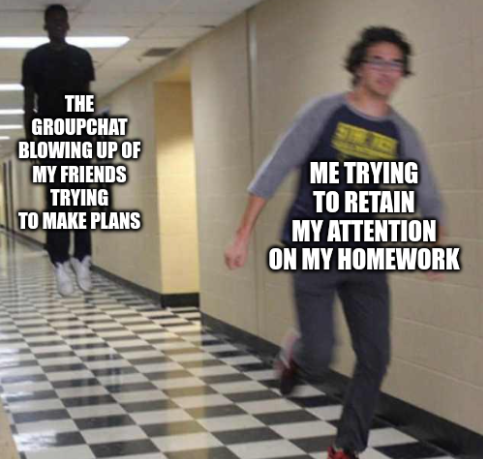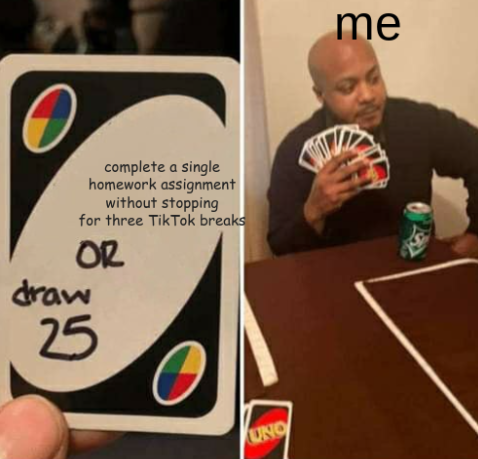By Lydia Clark
Introduction
Have you ever sat down to do homework, study, or to focus on a topic and realized that it is difficult to ignore distractions around you? Have you ever wondered why it is so difficult to filter out distractions, even though you desire to be productive? At several points in a student’s academic career, most people often struggle with truly remaining focused while doing schoolwork and other important tasks. There can be many aspects of why a student cannot stay focused, especially if they are preoccupied with other events in their life.
What is Selective Attention?
One main reason that students can become so easily distracted is that selective attention is an obstacle that every student faces. Selective Attention is the process of having an ability to focus on a particular subject in their direct environment for a specific amount of time. For a student to be truly productive with their work, they must put in effort with this process and actively ignore all other distractions around their working environment. For this process to be a success, a person must be selective in their own attention and realize what they must drown out in the background. For a lot of young people, it can be a challenging task to drown out distractions such as their phones or other technology that is not helpful to be used in the moment.

First Steps
One of the first steps that would be useful if you are looking to improve your selective attention skills, is to first assess what factors make you feel the most distracted. Also, what factors benefit you that you could continue to strengthen. (1) By knowing what makes us maintain or lose focus, it can benefit students with their weaknesses and improving them. (1) So, it is essential to analyze what makes your selective attention skills weaker. For instance, is someone trying to have a conversation with you while you are working? Are you in a different environment than usual? These are only a couple examples of instances where selective attention would come into play.
You may be reading this post and thinking to yourself, “But what if it’s difficult to not get distracted by the other things going on around me”? While every single person has a varying attention span, the ability to sharpen your selective attention is a skill that can be learned. Have you ever started a new sport or a skill and had the thought that it was difficult at first? After some practice, did you realize that you were improving in that skill? The same thing can be done with selective attention. (2) Humans can improve factors like skills and attention. When our brains grow to fit our environment (brain plasticity), we are then able to build and improve our attention skills. (2) Our brains are very malleable and even attention is an important skill that can be worked on. So, slowly start to put away distractions while doing schoolwork and improve factors like studying environments!

What If I Can Complete Multiple Tasks at Once?
In fact, you may have even read that paragraph and thought to yourself, “But I’m able to do multiple things at once.” No, this is incorrect. Even though you may think that you are a great multi-tasker, the brain is not able to focus on multiple things at once. This is why the skill of selective attention is so important and why retaining focus leads to success. (3) While performing tasks that require your divided attention, people that are more prone to multi-tasking are correlated with low performance. (3) Factors like social media have been determined that it has a harmful impact on completing tasks. Considering this, focus on one task at once and not overload your brain with them. The more tasks you are trying to do at once, the more time they will take!
Attention Awareness
Another important way of improving your selective attention skills and productivity is to have an active approach in the way you think. The ability to have an awareness of your own thinking and understanding the way you process information is a process called metacognition. By being aware of these processes, you can be able to start to form certain strategies to be productive and improve your attention skills. (4) There has been evidence that diligent students use strategies for completing tasks. Strategies can help improve reasoning and problem-solving skills. (4) Some examples of strategies that can be obtained can be skills like chunking up your homework so that you do not get overloaded; or making sure that you understand what you are trying to complete so that attention can be sustained better. The more that you are confused about an assignment or reading, the more your mind will drift.
Speaking of mind drifting, one factor that will benefit your productivity with homework, is to pay attention in class! Have you ever been in class listening to the lecture and suddenly, you have the thought, “I wonder what I’ll have for lunch”? Even thoughts this simple will cause your attention to be focused elsewhere and not focusing on the lesson. It is vital that you work on your selective attention in class and to try to keep your focus. (5) Students with stronger selective attention can focus on information connected to their studies. (5) Unfortunately, students with weaker selective attention skills can be more prone to poor learning skills. So, gradually start paying attention in class, it can be extremely difficult at times; but effort goes a long way. Factors like understanding your homework and test scores will be improved.
Motivation
One thing that will also help you stay motivated, and personally, what has helped me is goal setting. This is a small step, but it can benefit you in paying attention to schoolwork and other important aspects. Even setting the smallest of goals will go a long way. Some examples of some goals that you may set are things like; I would like to get an A on this homework assignment! It would be amazing to get a B on the next quiz!
To add, the very most crucial factor you can do in college for improving your selective attention is to take breaks! Even if you are a very productive worker, everyone’s brain will end up getting tired during longer assignments or even if it is just a heavy homework night! When your brain is tired, you are not able to complete the task with as much quality as you would when you are not tired. You are not able to perform and focus your best if you are not feeling the best!
Conclusion
Lastly, take a deep breath and remember that college is doable! Classes can (and will) be difficult but if you remember these things about selective attention, you will be on a good path of success. Keeping factors in mind like knowing what distracts you, what benefits you, and what keeps you motivated will all help you maintain focus in college.
References
- Hovington, Cindy, et al. “HOW DOES MY BRAIN PAY ATTENTION? A SERIES OF ACTIVITIES TEACHES STUDENTS ABOUT ATTENTION AND WHAT THEY CAN DO TO CONTROL IT.” Science and Children, vol. 52, no. 6, 2015, pp. 45–53. JSTOR, http://www.jstor.org/stable/43502070. Accessed 28 Apr. 2024.
- Eriksen, Charles W., and John W. Rohrbaugh. “Some Factors Determining Efficiency of Selective Attention.” The American Journal of Psychology, vol. 83, no. 3, 1970, pp. 330–42. JSTOR, https://doi.org/10.2307/1420410. Accessed 28 Apr. 2024.
- Kokoç, Mehmet, et al. “How Deeply Does Media and Technology Usage Affect the Sustained Attention?” International Journal of Human-Computer Interaction, vol. 38, no. 15, Sept. 2022, pp. 1410–21. EBSCOhost, https://doi.org/10.1080/10447318.2021.2002049.
- Liang, Ting. “Metacognitive Strategies in Undergraduate College Students’ English Writing Based on Optimization Theory.” Mathematical Problems in Engineering, Oct. 2022, pp. 1–11. EBSCOhost, https://doi.org/10.1155/2022/5978676.
- MCGLYNN, KAITLYN, and JANEY KELLY. “Self-Improvement through Goal Setting.” Science Scope, vol. 41, no. 2, 2017, pp. 22–24. JSTOR, http://www.jstor.org/stable/26387193. Accessed 28 Apr. 2024.
Hi Lydia; I struggle with staying focused during studying and class, and it can be frustrating sometimes. I often find myself checking my phone while doing homework. You mentioned that taking breaks can be beneficial. In order to be beneficial, how often should the breaks be, and for how long?